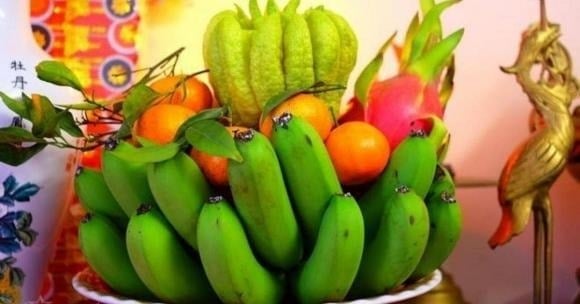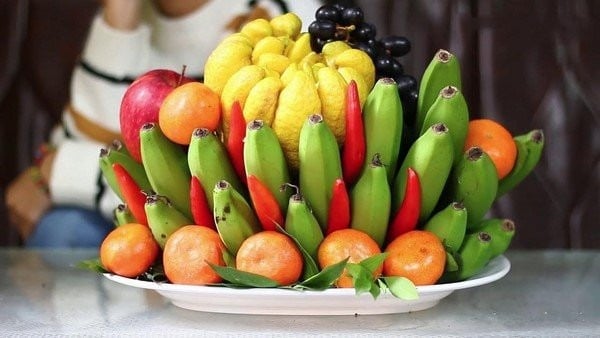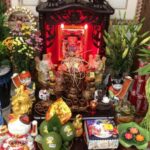Why Burn Incense with Bananas?
Bananas are a popular fruit, enjoyed by many, especially during festive occasions, full moon, and new moon celebrations. For many Vietnamese families, bananas are an essential component of their ancestral altar offerings. Typically, bananas occupy a central position in the fruit tray, with other fruits arranged around them.
In Vietnamese culture, bananas are not only affordable and easily accessible, but they also carry a strong connection to the country’s agricultural heritage. Offering bananas and burning incense is more than just a ritual; it symbolizes a plea for blessings and peace. The curved shape of the banana bunch, with the fruits hugging each other, represents protection and unity, attracting wealth and good fortune for the family.

Bananas are a popular fruit, especially during festive occasions.
Taboos to Keep in Mind When Using Bananas for Incense Burning
Despite the popularity of bananas in ancestral worship, there are some taboos to be aware of when using them for incense burning, as advised by traditional customs.
Choosing the Right Type of Banana: The selection of bananas for incense burning can vary across regions. In Northern Vietnam, people often choose longer, curved bananas, while in Central Vietnam, there is a tendency to avoid using royal bananas or those reserved for offering to kings. Thus, it is advisable to select bananas that align with the customs of your specific region to maintain reverence and respect.
Avoid Burning Banana Incense at Cemeteries: Traditionally, bananas are placed on home altars and are not recommended for use when burning incense at cemeteries. This is based on the belief that bananas might attract negative energy from such places.
Refrain from Using Bruised or Damaged Bananas: When burning incense, it is essential to use intact banana bunches that are not separated or bruised. Overripe or damaged bananas, as well as incomplete bunches, are not suitable for offerings. Combining multiple banana bunches to create a fuller arrangement is also discouraged to maintain the solemnity and sanctity of the ritual.

Overripe or damaged bananas are not suitable for offerings.
How to Choose Bananas for Incense Burning
When selecting bananas for incense burning, opt for ripe but firm bunches. Overly ripe bananas tend to fall off the stem, detracting from the aesthetic presentation on the altar. Greener bananas provide a sturdier base for displaying other fruits.
Additionally, it is considered auspicious to choose banana bunches with an odd number of fruits. In folk beliefs, odd numbers represent the yang principle and are associated with good luck and prosperity. Even numbers, on the other hand, symbolize the yin principle and are not considered favorable.
When purchasing bananas, avoid letting the bunch touch the ground. During cleaning, simply remove any dirt or dust without wetting the bananas before placing them on the offering tray.






































